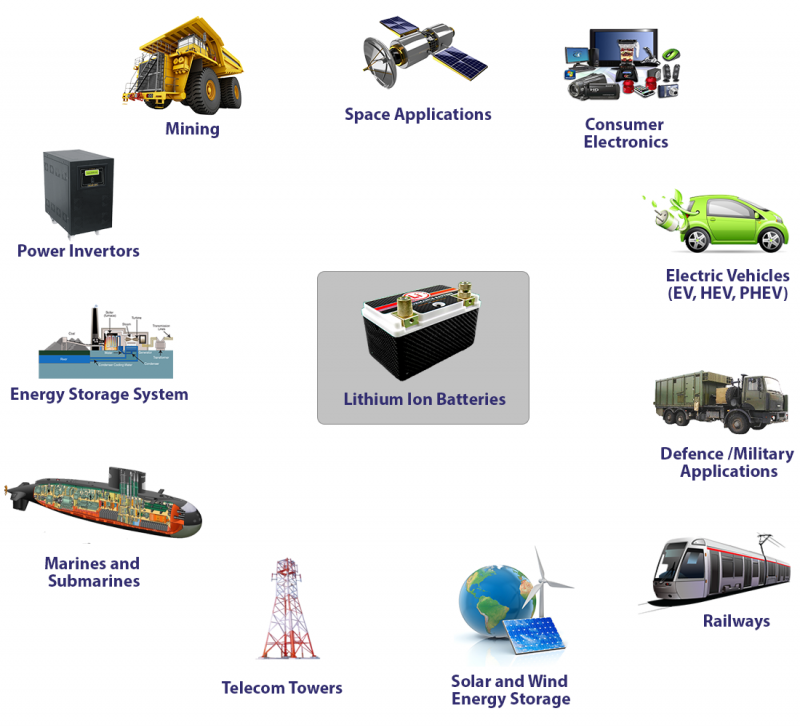
Lithium Ion Batteries offer numerous advantages like compact size, light weight, high energy density, high depth of discharge, low self discharge, long cycle life, etc.
Thus, these batteries have secured an upper hand over other battery technologies and find their use in varied applications consumer electronics, electrical vehicles, solar devices, railways, telecommunications, etc.
Consumer Electronics such as mobiles, laptops, tablets, pads, notebooks, music players, cameras, etc are some commonly known daily use devices which use lithium batteries.Since there is a wide variety of such devices, thus this is a very potential segment for lithium batteries.
Electrical Vehicles are becoming the need for modern transportation, due to rapidly depleting fossil fuels.
Over years, different battery technologies have been used for electric vehicles.
In order to enhance the performance of electric vehicles, a new modern battery technology needs to be adopted which can offer the desire speeds and distance ranges. Thus, lithium batteries are the newest battery technology being adopted for electric vehicles.
Railways have a vast network of transportation and operations, some of the areas not being well developed.
Thus, Railways need to have an adequate source of energy storage and backup. Also, Railway Coaches are equipped with safety lamps which operate in case of an emergency or mishap.
Thus, lithium battery is the best suited option for energy storage and backup for railways equipments.
Lately, MetroRail has grown and developed to a great extent and opened newer application for lithium batteries.
Telecommunications sector has been a tremendous growth over the past decade with the increased use of mobile phones.
In order to maintain their service, telecom companies need to ensure a 24*7 power supply for their equipments and systems. Thus, it is essential for them to have an adequate energy backup.
Owing to the modern and intelligent systems, compact size, light weight, long cycle life and other promising factors, telecommunications have shifted over to lithium battery technology.
Also, with modern telecommunications focusing on systems such as monopoles, lithium batteries offer a very prospective and potential application.
Solar and Wind Energy are the newer renewable energy options that have been accepted as the alternate for energy systems.For these type of renewable energies, which are available only for a limited time, it is very essential to have an efficient and effective storage option, in order to minimise the energy wastage.
Since lithium battery offers a very quick and efficient charging as compared to other battery technologies, thus it has gained acceptance in the field of renewable energy storage.
Also, equipments like solar lamps, solar lanterns, solar torches, etc need to handy and light in weight and thus promote the use of lithium batteries.
Mining activities are performed under abusive environmental and temperature conditions. It is very essential to use a safe and reliable battery technology for such applications.
Thus, lithium batteries are highly preferred for such applications, since these are highly safe and reliable, offer a wide operating temperature range, unaffected by abusive environmental conditions, etc.
Defence and Military Systems such as communications devices, radars, recording equipments, measuring devices, etc need to have a high level of accuracy and dependability.
Thus, they need to have a very safe, reliable and efficient battery backup. So, lithium batteries offer the desired features such as light weight, compact size, long cycle life, safety, reliability, etc.
Energy Storage Systems have become the modern day source of power and energy in case of any mishap or natural calamity.
Such systems are capable to provide energy and power for an entire area or township.
Thus, lithium batteries are the most suited energy storage option for energy storage systems, since these are compact in size, offer high depth of discharge, rapid charging, etc.

 +91-9988146499, +91-9988146599
+91-9988146499, +91-9988146599